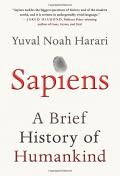BKMT READING GUIDES
Sapiens: A Brief History of Humankind
by Yuval Noah Harari
Hardcover : 464 pages
66 clubs reading this now
2 members have read this book
New York Times Bestseller
A Summer Reading Pick for President Barack Obama, Bill Gates, and Mark Zuckerberg
From a renowned historian comes a groundbreaking narrative of humanity’s creation and evolution—a #1 international bestseller—that explores the ways in which biology and ...
Introduction
New York Times Bestseller
A Summer Reading Pick for President Barack Obama, Bill Gates, and Mark Zuckerberg
From a renowned historian comes a groundbreaking narrative of humanity’s creation and evolution—a #1 international bestseller—that explores the ways in which biology and history have defined us and enhanced our understanding of what it means to be “human.”
One hundred thousand years ago, at least six different species of humans inhabited Earth. Yet today there is only one—homo sapiens. What happened to the others? And what may happen to us?
Most books about the history of humanity pursue either a historical or a biological approach, but Dr. Yuval Noah Harari breaks the mold with this highly original book that begins about 70,000 years ago with the appearance of modern cognition. From examining the role evolving humans have played in the global ecosystem to charting the rise of empires, Sapiens integrates history and science to reconsider accepted narratives, connect past developments with contemporary concerns, and examine specific events within the context of larger ideas.
Dr. Harari also compels us to look ahead, because over the last few decades humans have begun to bend laws of natural selection that have governed life for the past four billion years. We are acquiring the ability to design not only the world around us, but also ourselves. Where is this leading us, and what do we want to become?
Featuring 27 photographs, 6 maps, and 25 illustrations/diagrams, this provocative and insightful work is sure to spark debate and is essential reading for aficionados of Jared Diamond, James Gleick, Matt Ridley, Robert Wright, and Sharon Moalem.
Editorial Review
An Amazon Best Book of the Month for February 2015: Yuval Noah Harari has some questions. Among the biggest: How did Homo sapiens (or Homo sapiens sapiens , if you’re feeling especially wise today) evolve from an unexceptional savannah-dwelling primate to become the dominant force on the planet, emerging as the lone survivor out of six distinct, competing hominid species? He also has some answers, and they’re not what you’d expect. Tackling evolutionary concepts from a historian’s perspective, Sapiens: A Brief History of Humankind, describes human development through a framework of three not-necessarily-orthodox “Revolutions”: the Cognitive, the Agricultural, and the Scientific. His ideas are interesting and often amusing: Why have humans managed to build astonishingly large populations when other primate groups top out at 150 individuals? Because our talent for gossip allows us to build networks in societies too large for personal relationships between everyone, and our universally accepted “imagined realities”--such as money, religion, and Limited Liability Corporations—keep us in line. Who cultivated whom, humans or wheat?. Wheat. Though the concepts are unusual and sometimes heavy (as is the book, literally) Harari’s deft prose and wry, subversive humor make quick work of material prone to academic tedium. He’s written a book of popular nonfiction (it was a bestseller overseas, no doubt in part because his conclusions draw controversy) landing somewhere in the middle of a Venn diagram of genetics, sociology, and history. Throughout, Harari returns frequently to another question: Does all this progress make us happier, our lives easier? The answer might disappoint you. --Jon Foro
Discussion Questions
Of all the human developments described in Sapiens, which one do you think was the most significant in the course of our history?By what measures is homo sapiens the dominant species on planet earth?
Which was the most surprising fact or assertion that you came across while reading the book? Did you disagree with any of Harari’s arguments or interpretations?
Do you think that the major world religions are comparable to ‘shared mythologies’ such as nations, corporations and currency? When does a mythology become a reality?
Humankind has only been present for a minute fraction of planet earth’s existence – do you think that our civilization will retain its current position in centuries to come?
How can reading about history help us in the present day and the future?
Suggested by Members
Book Club Recommendations
Recommended to book clubs by 3 of 3 members.
Book Club HQ to over 88,000+ book clubs and ready to welcome yours.
Get free weekly updates on top club picks, book giveaways, author events and more








